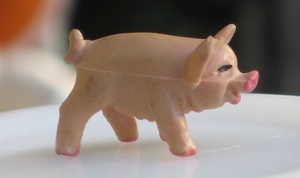Giving The Hairy Eyeball to Banking and Investment!
Bonuses on Wall Street aren’t addressed specifically on webcomic Wigu.com, but the storyline of the site does follow a fantasy of mine about staging a revolution against the present order. There’s a little yellow guy in a red cape named Topato, who sails into the castle and tells the princess, “We’re overthrowing your father’s offensively incorrect idea of a democratic government, my lady. The rule of Law must be allowed to change with the times.”
Right out of my own fantasy mouth! And Topato’s friend, co-leader of the revolution Sheriff Pony, says: “Princess Dongle, by removing your father from power we will be on the path to an equal society. No longer shall a minuscule elite class prey mercilessly upon a lackadaisical, overmedicated working class.”
Then Topato says: “It’s revolution o’clock…”
I consider them both holy men.
I admit I overly enjoy several internet comics. Like Goats.com. According to Goats, when you do something impossible, like invert so you’re sucked into your own personal black hole, thus entering a different universe consisting only of yourself, what is left in this universe is: a Pop Tart. Either that or a kitten, since apparently they’re equivalent.
But in this world, as we’ve seen, the U.S. government intervenes when it feels like it. Otherwise, AIG would now exist as a Pop Tart. (Or kitten.)
And the lots of many car dealerships would be rustling and meowing with — kittens!
When we turn on TV, we’d get back-to-back-to-back commercials for toaster pastries during Bones and 30 Rock instead of ads for Jeeps, Fords, and other pieces of doomed metal.
When Barney Frank opens his mouth to tell us how he’s protecting us in the overseeing of the bailout money, out will fall — a kitten!
Tim Geithner, when he gets hungry during meetings, will have no worries, because his pockets will miraculously be full of Toaster Strudels. (Which will make him very sticky. If he seems reluctant to shake hands, you’ll understand why.)
Eric Cantor will open his box of Lipton teabags to hand some out to his friends but will find only crushed crumbs of strawberry-frosted toaster pastries, mixed with kitten hairs.
Persons attending grass-roots protests of tax policy will discover neither grass nor root, only Pop-Tart policy with kitten tax.
(Images above from Wigu.com and used by permission of artist.)
*********
And now, shall we speak of Usury?
We are not speaking of simple moneylending, which Shylock engaged in. I never saw any proof that Shylock charged an unreasonable interest. He just had to find some sort of career out of the usual since he was a Jew and not allowed to own land.
We are referring to interest that is above and beyond what humans should be paying, charging usurious rates of interest on money lent. The notion of creating wealth for yourself from thin air this way disgusted our forefathers. They had respect for manual work, for craftsmanship, for farming, etc. They did not care, on the other hand, for people who found ways of getting the fruit of others’ labor through capitalizing.
Dante put Usurers in the same circle of Hell as sodomites and others who engaged in “unnatural practices.” Labor was “natural,” lending was not. The Roman Catholic Church considered it unearned income. So society was fairly prejudiced against lending to begin with; but as soon as economies began becoming more sophisticated (which happened in the Stone Age) it became a necesssary part of the whole. What was considered too high an interest to charge, then?
In past centuries, 10 percent often used to be a sort of cutoff. I don’t think it’s related to titheing. It’s just a number. For instance, British government in 1545 used to penalize lenders trying to charge more than that.
And today, ten percent seems to echo in many quarters, still, as an upper limit on consumer personal loans, but if you check laws for your state, they actually go all over the board. Some states don’t seem to even have a cap. And exceptions apply all over. Speaking of lending laws, why don’t credit cards fall under these laws completely? If the federal law states that a company may charge fees that are “legal” in the particular state the customer is in, how does it happen that I have the rates I do? Why are late payment penalties considered the same as interest and in what calculator does the penalty for a late $1 charge become $29 and still remain a legal percentage of the original charge? So a rate of 2900% is legal in my state? In any state??
Pardon. I seem to be foaming at the mouth.
Ah, Capital One. Ah, BOA, ah Wells Fargo. If only we were free to change the terms of our contract with you at any time, as you are. We would cut our rates by 5 percentage points; forgive ourselves for, say, 2 late payments per year; eliminate monthly or yearly membership fees and replace them with a single joining fee. That seems fair. And for your past practices, we grant ourselves the right to walk up to you in the street and slap you in the face once without legal repercussions, or key your cars once, or merely harmlessly spit on you each and every time we see you.
Now, that’s what I call a contract. And it’s social!
I wouldn’t feel so strongly if we were also able to earn similar interest in your banks when you use our money, you see. Why is it okay for banks and other lenders to charge these incredible percentages but no ordinary customer can get anything like that in any sort of savings instrument? Savings accounts, money market accounts yields have fallen to one-half, one, or perhaps two percent in most cases.
I am waiting to hear what happens with the bill Chris Dodd has gotten past committee in the Senate, which at least halts the hikes in rates on credit cards “at any time, for any reason” but feel sure that the CC companies will do what they can to FIND reasons.
Tomorrow among other things I might ponder the phone companies. The execs of those certainly get a lot of pay bonuses. And I will be annoying.
Don’t blame me; I get my orders from Sheriff Pony.
He’s blue.


 Mike Morgan, Wall Street blogger and reportedly a registered investment advisor (whatever that means, exactly), is being sued by Goldman Sachs for running his blog site,
Mike Morgan, Wall Street blogger and reportedly a registered investment advisor (whatever that means, exactly), is being sued by Goldman Sachs for running his blog site, 


